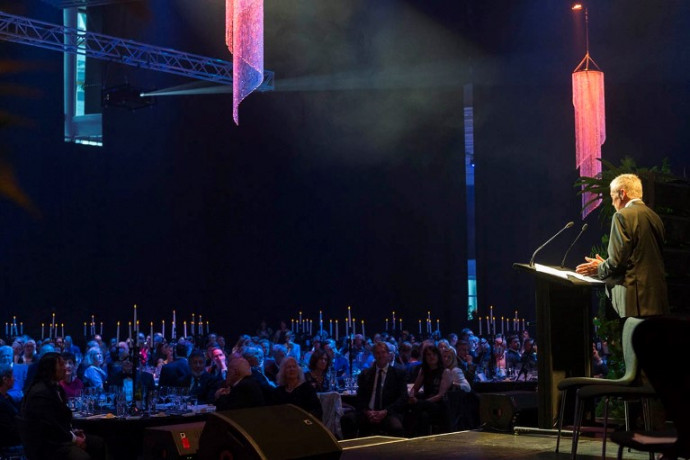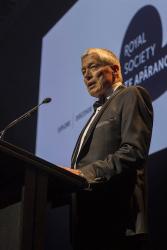News
Published 10 October 2017President's speech at New Zealand Research Honours

President’s welcome speech at the Royal Society Te Apārangi’s New Zealand Research Honours, 10 October 2017
E ngā waka, e ngā reo, e ngā mana, tēnā koutou katoa
E whakatau mai kōkiri tātau
Tēnā koe Taiaha, tēnā koe Paora
Tātai tangata ki te whenua, mau tonu, mau tonu
E ngā iwi o te motu, e ngā hau e whā
Tēnā koutou, a tēnā tātou katoa

Thank you again to Ngāti Whātua Ōrākei for the very warm welcome you have given us into your rohe. Welcome to all of you to a very special Research Honours Dinner in 2017.
We are delighted that their Excellencies the Governor General, Dame Patsy Reddy, and Sir David Gascoigne as well as our [caretaker] Minister of Science and Innovation, Paul Goldsmith, are present as we celebrate achievements by our researchers and our 150th birthday to the very day since an Act of Parliament on 10 October 1867 established our tīpuna, the New Zealand Institute, “to promote the general study and cultivation of art, science, literature and philosophy”.
We are greatly honoured this evening by the presence of several great leaders in Māoridom, including Tā Pita Sharples and Tā Tipene O’Regan, Patron and Board Chair respectively of Ngā Pae o te Māramatanga, the Centre of Research Excellence that specializes in employing Māori knowledge to advance our understanding of society, culture, the environment and the economy.
It is especially fitting to acknowledge the presence of Ngā Pae o te Māramatanga’s kaumatua and the Centre’s co-Directors, Professors Tracey McIntosh and Jacinta Ruru FRSNZ as we remember the origins of the Royal Society Te Apārangi in the 1860s when tangata whenua comprised the majority in the population in most parts of Aotearoa, and the study and cultivation of art, science, literature and philosophy invariably involved interchanges between Māori and pākehā.
150 years ago, in Tāmaki Makaurau, Ngāti Whātua Ōrākei had a robust economy and the harbour was full of trading ships. At that time immigrants from Britain were settling around the country, and forming groups to explore, discover and share what they were learning about Aotearoa both from Māori, and from their own research. Māori were to suffer enormously in many ways as a result of the British colonial project which gave birth to the New Zealand Institute.
150 years later the Royal Society Te Apārangi is seeking to develop an enduring, respectful relationship with Māori that is built much more on the principles which underpinned Ngāti Whātua Ōrākei’s early engagement with pākehā than the principles that dominated the colonial project. We have a lot of work to do to earn the respect and trust of our Māori scholars, teachers and communities. But we are committed to working in partnership with Māori, addressing serious gender imbalances in our academy, and promoting much greater diversity within our organisation.
To help set us on the right course for the next 150 years, it is my pleasure to announce tonight two significant steps forward for the Society.
Firstly, at the Research Honours dinner next year we will award a new medal, Te Puāwaitanga (‘the flourishing’) which has been gifted to the Society by Ngā Pae o te Māramatanga in recognition of our evolving partnership as we seek to make the Royal Society Te Apārangi relevant for Māori researchers and scholars. This will be Te Apārangi’s highest award in recognition of research that has made an eminent and distinctive contribution to Te Ao Māori, and to Māori and Indigenous knowledge. We are in the process of scoping two further medals which will acknowledge excellent research by Māori that is generating new knowledge and innovative pathways for transforming communities.
As a famous Māori whakataukī states:
Ko tō raurau, ko tōku raurau, ka ora tō iwi (with your knowledge and my knowledge we can grow together)
Our second step has been the Council’s decision to appoint as our President-elect, Professor Wendy Larner FRSNZ, FAcSS, FNZGS. Wendy is currently Provost at the Victoria University of Wellington. She will take over as President on 1 July 2018, as only the second female President in 150 years. We look forward to a very different mix of Presidents in terms of gender, ethnic identity and cultural heritage over the next 150 years.
Now to the real business of this evening. Tonight we will recognise excellence for those at the top of their fields.
Our own definition of excellence is changing to ensure we are thinking more inclusively, because great ideas and discoveries are not limited to academic research. Genius happens in any environment where new ideas are tested and implemented. It happened in Britten’s garage and Hamilton’s workshop, in businesses like Fisher and Paykel, and in Peter Buck’s Rocket Lab as much as in Rutherford’s university laboratory, or Tinsley’s observatory.
We also recognise the importance of impact of our research. Discoveries are more powerful when you put them to use. So tonight we reach out to say thank you to all those who investigate and research ideas; to organisations, businesses, and researchers of all types, genders and ethnicities who investigate our world and seek to innovate. What you do brings us all progress, knowledge and inspiration. We will be announcing next month several changes to our Fellowship and Medal awards processes to ensure we recognise more effectively the diversity of excellent researchers, scholars and innovators in 21st century Aotearoa.
This year we are pleased to be presenting four new awards for Early Career Researchers, along with our regular Hamilton award. This is why we encouraged our sponsors to bring along their own Early Career Researchers, to recognise the valuable contributions they are making to research.
Finally let me thank all our valued sponsors for putting in an extra special contribution for this 150th celebratory event. As I noted earlier, it was on this day in 1867 that Parliament passed the New Zealand Institute Act that laid the foundations for a multidisciplinary national academy in Aotearoa. Our sponsors capture well the intentions of our tīpuna - they span a wide range of research interests and disciplines.
Our Premium Partners: the Health Research Council, Auckland University and NIWA – we are especially grateful for your support. Thanks also to our Premium Sponsors: AUT, the MacDiarmid Institute and BRANZ; and our Core Sponsors who you can see on our screens. Without your support we could not celebrate the excellence of our researchers in this way. Thank you everyone.
Aku mihi nui ki a koutou
Emeritus Professor Richard Bedford QSO FRSNZ
President, Royal Society Te Apārangi
